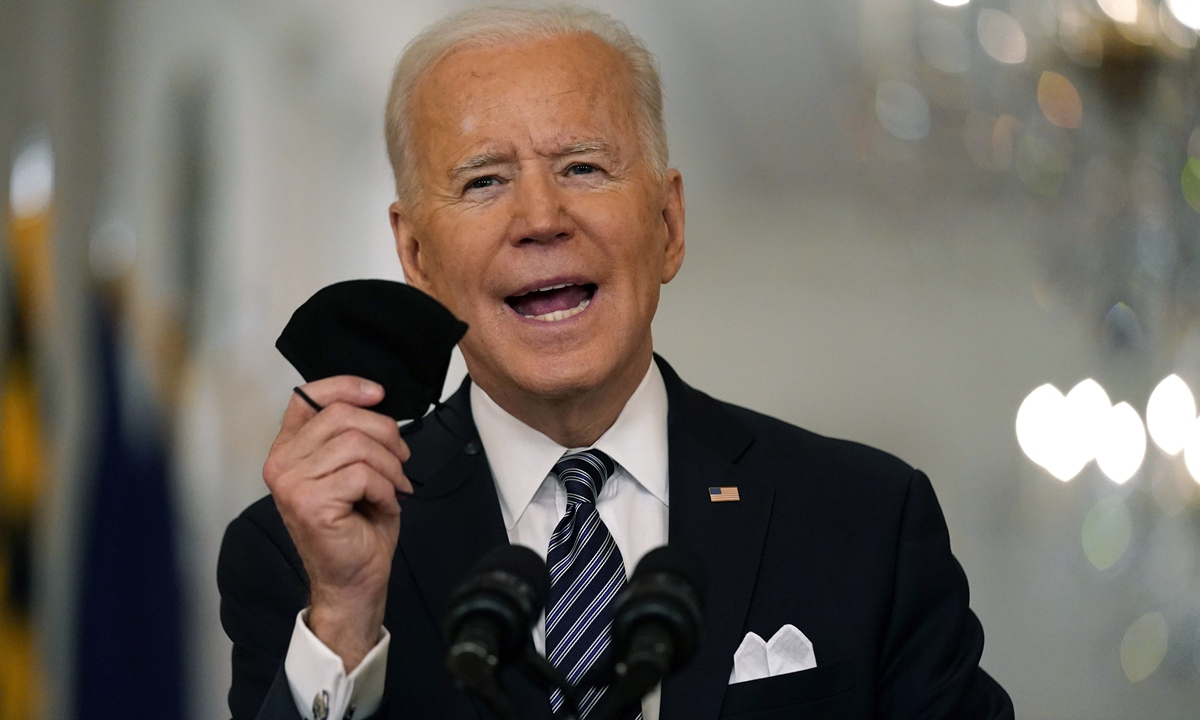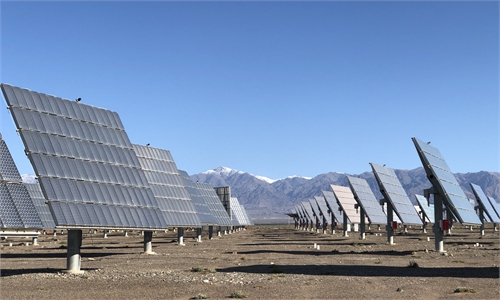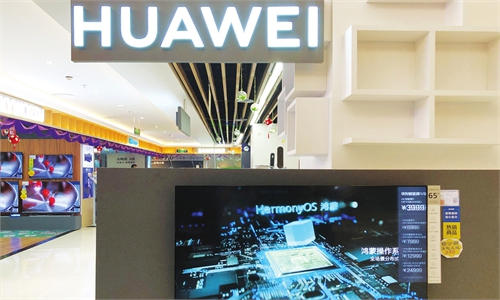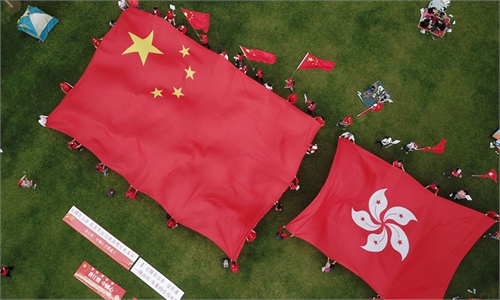Biden's escalation of economic decoupling over Xinjiang and Hong Kong a repeat of Trump tactics, US companies to be hurt

US President Joe Biden holds up his face mask as he speaks about the COVID-19 pandemic during a primetime address from the East Room of the White House on Wednesday in Washington. Photo: AP
The US has escalated its economic roundup of Chinese companies in Northwest China's Xinjiang Uygur Autonomous Region, urging US companies to stay out of the Xinjiang supply chain in a federal government warning. The US government is reportedly also mulling placing a warning of operational risks in Hong Kong this week, where the US has tremendous business interests.
The Biden administration's attempt, using human rights issue as an excuse, to return to a decoupling track is thinly veiled, which will end up hurting the interests of US companies, Chinese international affairs experts and industry insiders said on Wednesday.
By clinging on and further hyping up a lie made up by previous US administration, Biden's warning is like a continuation of Trumpism without Trump, Chinese experts noted. By implicitly hinting of a supply chain decoupling, analysts said the move showed the previous human rights card is ineffective and the Biden administration has to return to the old path of decoupling with a human rights banner.
Several US federal departments on Tuesday issued a government advisory, warning US companies of the risks of being a part of the supply chain with the Chinese region over the so-called "forced labor" issue. Another warning is reportedly to be issued on Hong Kong.
The warning includes a list that went to great lengths to specifically name 20 Xinjiang industries from cotton and melon to wig and toys that US companies should stay clear of, even though the warning itself admitted that listing "does not confirm that all goods produced in these industries in Xinjiang involves forced labor."
Among the US motivation to block local economic and human rights development and stir up chaos in China's Xinjiang and Hong Kong, cracking down on Chinese competitors to US companies is also one of the US government's malicious aims, Chinese analysts noted.
Compared with the Trump administration, Biden has gone further on launching political battle together with the decoupling strategies against China under the excuse of human rights, Lü Xiang, a research fellow at the Chinese Academy of Social Sciences in Beijing, told the Global Times on Wednesday, noting the US moves will severely undermine bilateral cooperation on climate change and finance.
The warning to US companies in Hong Kong also does not tally with the facts - after the enactment of the national security law for Hong Kong for the past year, the city has restored to stability and prosperity with foreign companies happy with the business environment, Lü said, noting that the warning looks more like the US' last try when all other tricks to disturb the region have been exhausted.
From Trump's trade war to Biden's political war and other aggressive provocations, the US has gone further astray on policies toward China, which brought more uncertainty to bilateral ties, Lü said, adding that China should be alert that the Biden administration's chariot may not stop once it starts.
"After Biden took office, his political performance has been mediocre… and lacking results. That's when he eagerly picked up the anti-China card in order to rally some popularity and respond to the criticism of the pro-Trump camp," Tian Feilong, an associate professor at Beihang University's law faculty, told the Global Times on Wednesday.
"In the US, as long as politicians play the anti-China card, they can get a boost. Biden knows this well," Tian said.

A planter is planting cotton in Northwest China's Xinjiang Uygur Autonomous Region in April. Photo: cnsphoto
US companies to be hurt
Chinese industry insiders and experts said the Biden administration will harm the interests of US companies by forcing them to draw a line, and this will open the stage for Chinese countermoves including the first use of China's entity list to punish unreliable supply chain partners.
Some foreign companies blindly following the US fabricated "forced labor" lie over Xinjiang cotton have paid a price as Chinese consumers moved to boycott their products, as was the case faced by Swedish apparel manufacturer H&M and American and German sportswear manufacturers Nike and Adidas.
H&M saw its sales down by 23 percent in China in local currencies from March to May, Reuters reported.
US sanctions on Xinjiang's photovoltaic industries would set hurdles to the imports of related products, affecting the global and the US development of renewable energy, Lü said. "The result? The Biden administration's promises on climate change would be stalled."
Tuesday's advisory by the US drew scorn from Chinese business communities.
On Wednesday, four polysilicon manufacturers in Xinjiang issued a joint statement in protest against the US' baseless accusation of "forced labor." "[The US government] seriously violated the development right of our companies and labor right of our employees, which is the typical 'forced unemployment' and 'forced poverty,'" the four companies said.
He Ning, director of investor relations at polysilicon producer Xinjiang Daqo which was put on the US entity list, told the Global Times on Wednesday that the company refuses to do a supply chain review to fit in with the US government's requirements as it has neither sold any products directly to US companies nor purchased any US products.
"So far, none of our clients asked us to do such supply chain review work," He said, adding that US companies cannot find substitutes within the short term if they do not buy Chinese solar panels.
The harm to the US will be way larger than the loss of Chinese companies when the US cracks down on Chinese solar products, veteran industry observers agreed as it would take the US a long time and a lot of money to develop industrial supporting ability in the solar energy sector.
Xinjiang accounts for around half of the world's polysilicon capacity - a raw material for solar panels.
Yi Jing, deputy general manager of Siwei Textile from Awati County, Aksu Prefecture of Xinjiang, told the Global Times that the company's sales have not been impacted by the US government hit. Instead, it inspired Chinese people's patriotic enthusiasm to support Xinjiang cotton.
"What the US companies lost is the huge Chinese market if they ban cotton products made in Xinjiang… One in every five 100 percent cotton products worldwide comes from Xinjiang.
China for sure is capable to dominate the global textile industry," Yi said.
The manager proposed tit-for-tat countermeasures including a ban on imports of US cotton and other US products.
Lü warned that if the Biden administration is crazy enough to take one step further - to upgrade the warning to concrete sanctions or orders to US companies, all foreign companies - from the US and EU, will suffer more since they still regard Hong Kong as the significant gateway to enter the market in the Chinese mainland and other Southeast Asian countries.
A US action covering Hong Kong will harm the investments and transaction relationships of US companies in the city, and a strong boycott to some US companies is to be expected, Tian warned.
"US interests in Hong Kong are sizable as it has a large amount of US investment," the professor said, citing that more than 1,200 US companies operate in Hong Kong to cover their businesses in the Asia-Pacific region, so the crackdown will harm the global layout of these US companies and their regional competitiveness.
The US move will wipe out the $30 billion trade surplus with Hong Kong Special Administrative Region, he added.
"Following Trump's path is very stupid for the Biden administration as it harms others without benefiting itself," Tian said.
In Trump's infamous trade war with China, US companies ended up suffering economic losses and US trade deficits to China were by no means reduced.
Craig Allen, president of the US-China Business Council, in June published an article in Politico titled "US-China trade dispute harms Americans" and cited Moody's Analytics suggesting that American companies had shouldered more than 90 percent of the costs of US tariffs on Chinese goods.
In response to the US' Tuesday move, Chinese Foreign Ministry spokesperson Zhao Lijian told the routine press conference on Wednesday that the US is repeating clichéd lies over China's Xinjiang and each time it only exposes its hypocrisy on human rights issues and its nature of hegemony, citing its own stained human rights record.
Chinese countermeasures
Zhou Shijian, a senior research fellow at the Center for US-China Relations at Tsinghua University, suggested China's unreliable entity list could be used as part of a retaliation tool.
"For instance, China could ban its supply of silicon, an indispensible material used in the solar industry, to certain US companies in retaliation," Zhou told the Global Times on Wednesday.
Some experts doubt whether US companies will actually heed Biden administration's warning.
Liang Haiming, chairman of the China Silk Road iValley Research Institute told the Global Times that he suspects the warnings are more symbolic than real and the government cannot prevent US investors who are willing to invest in Hong Kong.
A recent job expansion program revealed by Citibank and Goldman Sachs shows that US investors have a rather different understanding of the risks of investing in Hong Kong than the US government.



